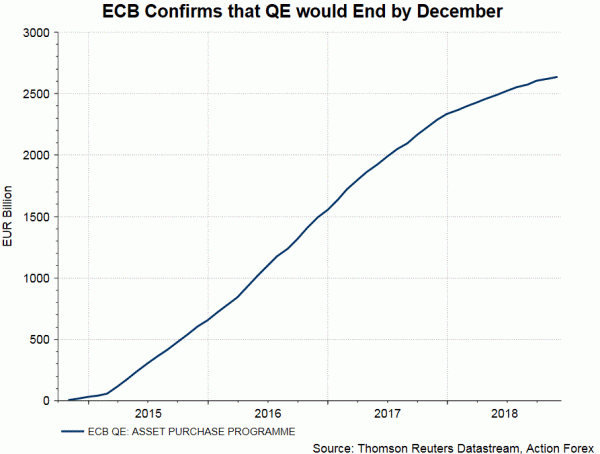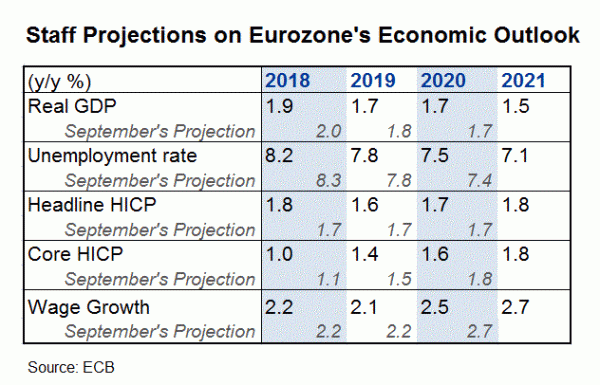At the December meeting, ECB formally announced that the asset purchase program (QE) would end by this month. In order to maintain the size of the balance sheet at the current 2.6 trillion euro, the central bank would reinvest the proceeds for “an extended period of time” which should well past that of the first rate hike. the forward guidance on interest rate stayed unchanged. The members remained confident, but more cautious, about the economic outlook. The staff economic projections showed downgrades of both GDP growth and inflation for the coming years. Since ECB made no mention on a new round of targeted long-term refinancing operations (TLTROs), we expect it would announce this early next year. The ECB released a separate statement regarding the change in capital key.
Forward Guidance
The focus of the meeting was on the life after QE. At the accompanying statement, ECB updated the reference on the reinvestment plan, suggesting that it would “continue reinvesting… for an extended period of time past the date when it starts raising the key ECB interest rates, and in any case for as long as necessary”. President Mario Draghi noted that the change was an unanimous decision. The forward guidance on interest rate stayed the same – no rate hike “at least through the summer 2019”. While giving no definite timing for the end of reinvestment, i.e., the beginning of balance sheet reduction, we anticipate it would continue at least through end-2020.
Economic Projections
The members remained confident about the economic outlook, reiterating that the risks surrounding Eurozone’s growth outlook are “broadly balanced”. Yet, it added that “the balance of risk is moving to the downside”, due to “persistent uncertainties relating to geopolitical factors, the threat of protectionism, vulnerabilities in emerging markets and financial market volatility”. ECB’s view to economic outlook can thus be categorized as cautiously optimistic. As such, the staff downgraded the economic projections. GDP growth for this year is revised lower to +1.9%, from +2% projected in September. Growth would moderate further to +1.7% in 2019 (Sep: +1.8%) and stabilize at this level in 2020. On inflation, headline CPI is revised higher, by +0.1 percentage point, to +1.8% for this year. This is mainly driven by the rally in energy prices in the third quarter of the year. Headline CPI would ease to +1.6% (Sep: +1.7%) in 2019 and improve slightly to +1.7% in 2020. ECB downgraded core inflation through to 2020, signaling that sluggish wage growth has prohibiting improvement in the underlying price levels.
TLTROs
ECB did not mention any plan of new TLTROs. As mentioned in our preview article, we expect the central bank would eventually launch a new round of these operations. The announcement of which could be made in December or early 2019. Such operations should help reduce the impact of liquidity tightening as driven by the end of QE. ECB’s downgrades of economic forecasts reinforced our view that stimulus are still needed in the bloc. In order to maintain growth and achieve the inflation target of “below, but close to, +2%”, ECB would find it necessary to keep some other non-standard monetary policy tools after QE is ended. TLTROs suit this need as they provide long-term loans to banks, incentivizing them to increase their lending to businesses and consumers in the Eurozone.


